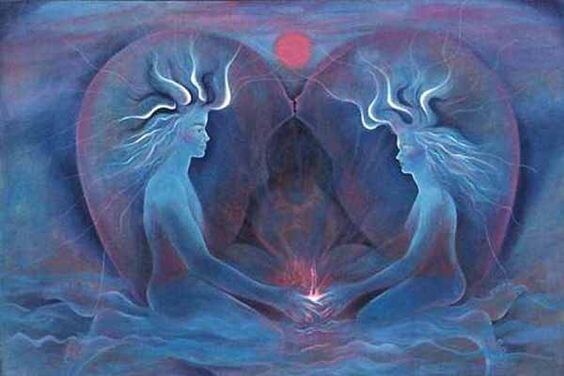Love in the Third Age of Life


Written and verified by the psychologist Gema Sánchez Cuevas
Love in the third age of life is filtered by lived experience and the serenity of the heart. We’re talking about people in the autumn of their life who understand love, no longer as a conquest or an invasion, but as a connection based on joy, tenderness, and complicity. These are usually honest relationships that provide the couples with wonderful experiences.
It’s often said that true love awaits us in maturity. However, it must be said that this isn’t always entirely true. That’s because we have a tendency to keep comparing our current experiences to those in our youth. This isn’t helpful. After all, living means knowing how to appreciate everything that happens at each stage of our lives. For example, we can be grateful for both our successes and mistakes of youth and, at the same time, we can enjoy each gift that maturity offers us.
“Mature love is union under the condition of preserving one’s integrity, one’s individuality.”
-Erich Fromm-
Each cycle allows us to accept everything that comes to us in a certain way. For example, when we’re young we hardly impose any filters and we embrace everything we find with immense desire and infinite energy. We’re like intense summer storms. Later, we become more selective, more cautious. While we still have the memory of those intensely hot summers, we now prefer warmer breezes and calm, bright afternoons.
Love in the third age doesn’t mean we give up our joviality or innocence. However, we’re extremely careful not to repeat the same mistakes. We know very well that, as a partner, we’re not simply ‘half of the orange’. In fact, we’re whole. We’re people who carry diverse and sometimes extremely different experiences on our backs. We’re souls with our own individuality who want to give love another chance… and why not? Let’s take a look at love in the third age.

Love in the third age, when getting old is synonymous with happiness
Albert and Margaret are both in their sixties and have decided to take the plunge to live together. There’s no lack of criticism from some of their children. One says it must be for economic reasons. Another claims they’re just doing it because they don’t want to be lonely. It’s a whim, in a few months they’ll return to their own places, their grandchildren, their lives…
However, neither Albert nor Margaret care too much about these criticisms and opinions. Their wrinkles and scars, although they tarnish their bodies a little, give strength to their hearts and wills. What they’re doing they’re doing knowingly. They’re not children. Indeed, maturity doesn’t go along with naivety, but good wisdom. In addition, their emotional and experiential backpacks hold infinite experiences. This means they certainly haven’t taken their decision on a whim.
As a matter of fact, their autumnal love goes far beyond what their children think, as well as all those others who look at them strangely. Looks they see but choose not to notice. Their love has nothing to do with selfishness nor does it need to prove anything to others. Because there’s nothing artificial about it. Their thoughts, their purposes, and their caresses are so sincere that they’re illuminated by the light of truth. In fact, their love is so complete that it fills their heads, hands, and hearts.

However, Albert and Margaret are well aware that many younger people associate maturity and the third age of life with passivity and resignation. It’s as if they believe that love and passion have an expiry date, as if it were forbidden territory for those with gray hair, for those who have more of their life behind than ahead of them.
“Young love lives on enthusiasm, mature love on harmony.”
They’re mistaken. Indeed, if there’s one thing that positive psychology teaches us, it’s that the curve of happiness reaches its highest peak at this stage of life. It’s a moment where love is lived in a much clearer and cleaner way.
The new timeline and the importance of love
Love in the third age is more than just satisfactory. It’s not a fire that burns, but a river that takes us on a journey of discovery as a couple, where we can continue to grow, experiment, and nurture a new type of happiness. Because beyond what some skeptics may believe, it’s at this stage that, on average, we experience greater psychological well-being.
The economists, Blanchflower and Oswald, conducted an interesting study in which they claimed that the perception of well-being and personal satisfaction is experienced more intensely in childhood and in middle age. The happiness represented throughout our life cycle would therefore have a ‘U’ shape, reaching its first peak in childhood and the second in our fifties.

However, the passing years are not necessarily always synonymous with increased psychological maturity. Emotional balance is also not guaranteed to be the norm at this stage. Nevertheless, a good part of the population enters the fall of their lives with exceptional integrity and a wonderful attitude.
They’re people who aren’t limited to considering their accumulating years, but feeding their hopes and desires. They’re men and women who’ve conquered themselves. They have charisma and a kind of alchemy where they combine wisdom with hope, serenity with passion, and desire with humility.
Love in the third age may not be as effusive as the first love of adolescence. However, they’ll undoubtedly be more fruitful and more satisfying.
Love in the third age of life is filtered by lived experience and the serenity of the heart. We’re talking about people in the autumn of their life who understand love, no longer as a conquest or an invasion, but as a connection based on joy, tenderness, and complicity. These are usually honest relationships that provide the couples with wonderful experiences.
It’s often said that true love awaits us in maturity. However, it must be said that this isn’t always entirely true. That’s because we have a tendency to keep comparing our current experiences to those in our youth. This isn’t helpful. After all, living means knowing how to appreciate everything that happens at each stage of our lives. For example, we can be grateful for both our successes and mistakes of youth and, at the same time, we can enjoy each gift that maturity offers us.
“Mature love is union under the condition of preserving one’s integrity, one’s individuality.”
-Erich Fromm-
Each cycle allows us to accept everything that comes to us in a certain way. For example, when we’re young we hardly impose any filters and we embrace everything we find with immense desire and infinite energy. We’re like intense summer storms. Later, we become more selective, more cautious. While we still have the memory of those intensely hot summers, we now prefer warmer breezes and calm, bright afternoons.
Love in the third age doesn’t mean we give up our joviality or innocence. However, we’re extremely careful not to repeat the same mistakes. We know very well that, as a partner, we’re not simply ‘half of the orange’. In fact, we’re whole. We’re people who carry diverse and sometimes extremely different experiences on our backs. We’re souls with our own individuality who want to give love another chance… and why not? Let’s take a look at love in the third age.

Love in the third age, when getting old is synonymous with happiness
Albert and Margaret are both in their sixties and have decided to take the plunge to live together. There’s no lack of criticism from some of their children. One says it must be for economic reasons. Another claims they’re just doing it because they don’t want to be lonely. It’s a whim, in a few months they’ll return to their own places, their grandchildren, their lives…
However, neither Albert nor Margaret care too much about these criticisms and opinions. Their wrinkles and scars, although they tarnish their bodies a little, give strength to their hearts and wills. What they’re doing they’re doing knowingly. They’re not children. Indeed, maturity doesn’t go along with naivety, but good wisdom. In addition, their emotional and experiential backpacks hold infinite experiences. This means they certainly haven’t taken their decision on a whim.
As a matter of fact, their autumnal love goes far beyond what their children think, as well as all those others who look at them strangely. Looks they see but choose not to notice. Their love has nothing to do with selfishness nor does it need to prove anything to others. Because there’s nothing artificial about it. Their thoughts, their purposes, and their caresses are so sincere that they’re illuminated by the light of truth. In fact, their love is so complete that it fills their heads, hands, and hearts.

However, Albert and Margaret are well aware that many younger people associate maturity and the third age of life with passivity and resignation. It’s as if they believe that love and passion have an expiry date, as if it were forbidden territory for those with gray hair, for those who have more of their life behind than ahead of them.
“Young love lives on enthusiasm, mature love on harmony.”
They’re mistaken. Indeed, if there’s one thing that positive psychology teaches us, it’s that the curve of happiness reaches its highest peak at this stage of life. It’s a moment where love is lived in a much clearer and cleaner way.
The new timeline and the importance of love
Love in the third age is more than just satisfactory. It’s not a fire that burns, but a river that takes us on a journey of discovery as a couple, where we can continue to grow, experiment, and nurture a new type of happiness. Because beyond what some skeptics may believe, it’s at this stage that, on average, we experience greater psychological well-being.
The economists, Blanchflower and Oswald, conducted an interesting study in which they claimed that the perception of well-being and personal satisfaction is experienced more intensely in childhood and in middle age. The happiness represented throughout our life cycle would therefore have a ‘U’ shape, reaching its first peak in childhood and the second in our fifties.

However, the passing years are not necessarily always synonymous with increased psychological maturity. Emotional balance is also not guaranteed to be the norm at this stage. Nevertheless, a good part of the population enters the fall of their lives with exceptional integrity and a wonderful attitude.
They’re people who aren’t limited to considering their accumulating years, but feeding their hopes and desires. They’re men and women who’ve conquered themselves. They have charisma and a kind of alchemy where they combine wisdom with hope, serenity with passion, and desire with humility.
Love in the third age may not be as effusive as the first love of adolescence. However, they’ll undoubtedly be more fruitful and more satisfying.
This text is provided for informational purposes only and does not replace consultation with a professional. If in doubt, consult your specialist.







